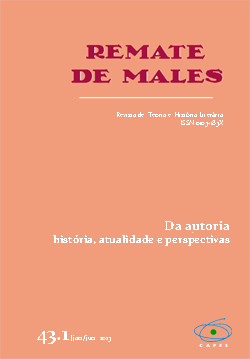Abstract
This paper aims to analyze Torto Arado (2019), by Itamar Vieira Júnior, given the role that the journey of ideas plays in 19th century Brazilian regionalism, and in its recovery, in the 21st century. In the 19th century, European intellectuals such as Bouterwek, Sismondi, and Ferdinand Denis played a key role in the development of nationalism in Brazilian literature. Regionalism, as an aesthetic guided by the description of spaces and characters away from urban centers, was influenced by nationalist ideas coming from Europe, especially from France. In the 21st century, regionalism is retaken by Itamar Vieira Júnior, but based on the journey of new concepts developed by gender and race studies in the North American context. In this regard, this paper presents this hypothesis: the journey of literary theory, especially of studies produced in American universities - cultural studies, queer studies, post-colonial studies, subaltern studies, disability studies, afro-american studies, latino studies – impact on Brazilian regionalism. If in the 19th century, space was a determining element of the psychology of the characters, in the 21st century other issues are brought to the debate: the condition of a woman, black in a country that still suffers from its patriarchal and slave-owning past. Therefore, this paper will analyze Torto Arado's regionalism given three aspects: the journey of ideas, the discrepancies with 19th century regionalism, and the reconfiguration of the genre in the 21st century based on issues raised by literary theory.
References
DENIS, Ferdinand. Résumé de l’histoire du Brésil. Paris: Lecointe & Durey, 1825.
DURÃO, Fábio Akcelrud. Teoria (literária) americana: uma introdução crítica. Campinas: Autores Associados, 2011.
MARCHEZAN, Luiz Gonzaga. O conto regionalista: do romantismo ao pré-modernismo. São Paulo: Martins Fontes, 2009.
ROMERO, Silvio. A filosofia no Brasil. In: Obra filosófica. São Paulo: José Olympio, 1969, pp. 5-149.
ROUANET, Maria Helena. Eternamente em berço esplêndido: a fundação de uma literatura nacional. São Paulo: Siciliano, 1991.
SCHWARZ, Roberto. O pai de família e outros estudos. Rio de Janeiro: Paz e Terra,1978.
SCHWARZ, Roberto. Que horas são? Ensaios. São Paulo: Companhia das letras, 1987.
SCHWARZ, Roberto. Um mestre na periferia do capitalismo. São Paulo: Duas
Cidades, 2000.
SCHWARZ, Roberto. Ao vencedor as batatas: forma literária e processo social nos
inícios do romance brasileiro. São Paulo: Duas Cidades, 2012.
VIEIRA JR, Itamar. Torto arado. São Paulo: Todavia, 2019.

This work is licensed under a Creative Commons Attribution-NonCommercial 4.0 International License.
Copyright (c) 2023 Creative Commons Licence


